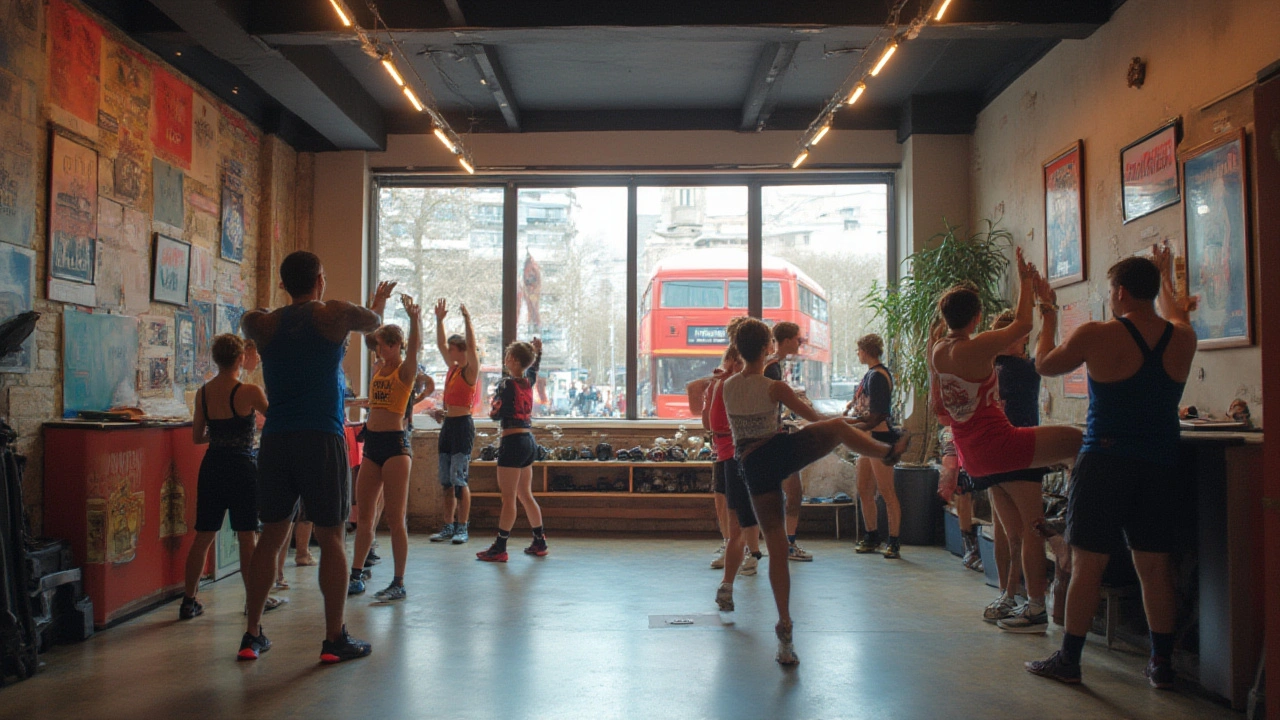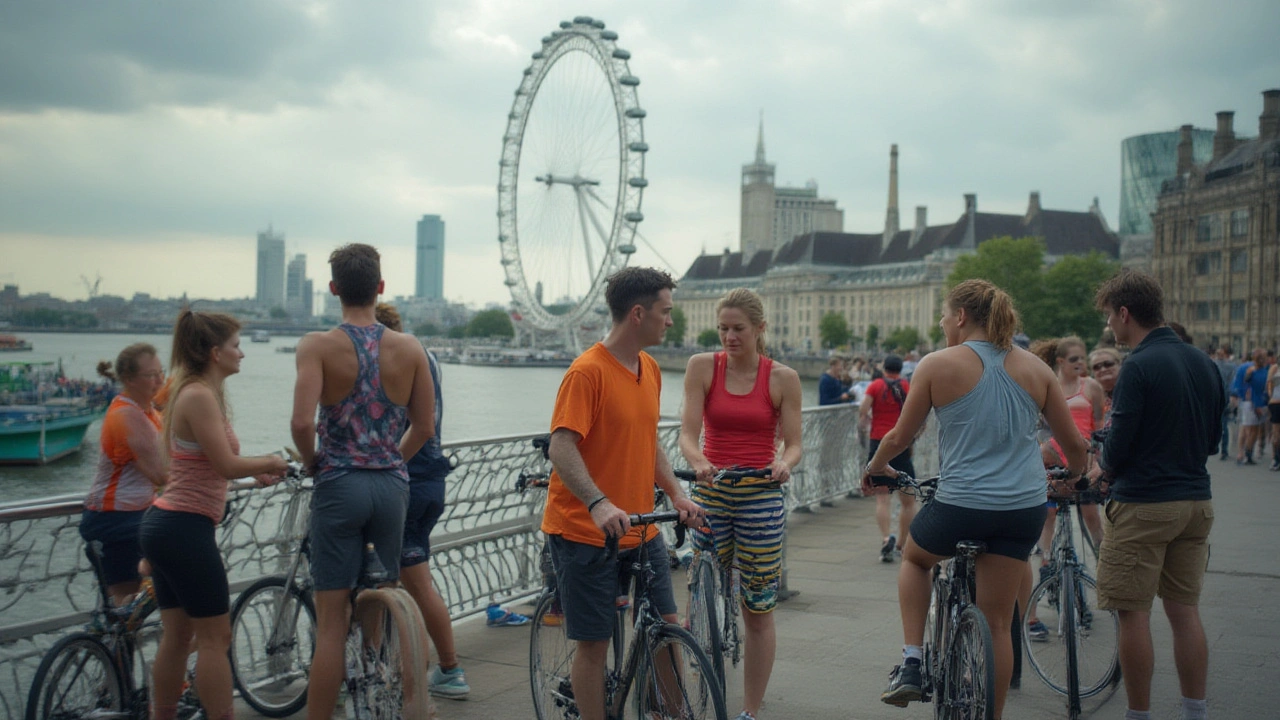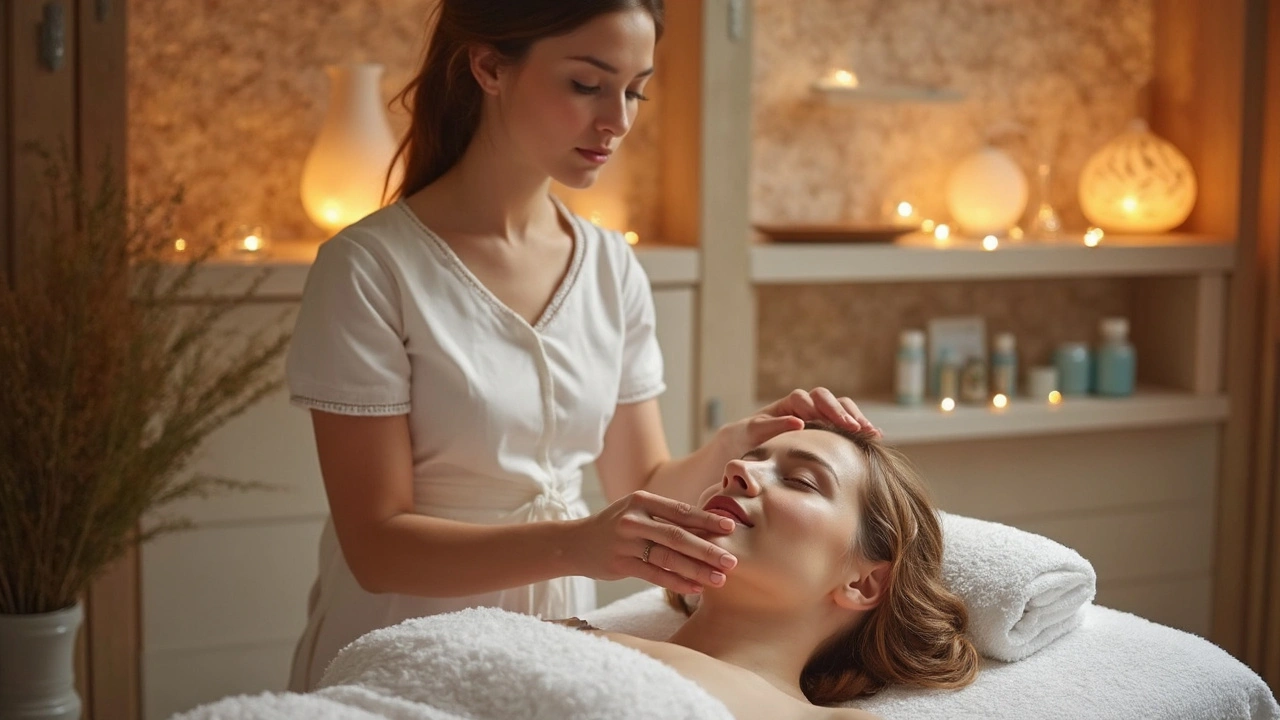Indian head massage in London offers a simple yet powerful way to relax and rejuvenate. Learn how this ancient technique can improve your well-being and discover where to find top-notch services in London. Whether you're a busy Londoner or a visitor, this guide helps you unwind and find the right massage for you.

- Created by: Elara Wainwright
- Completed on: 31 Jul 2025
- Categories: Sports Massage
Key Points
- London is home to some of the most advanced sports massage techniques, catering to every type of athlete and fitness enthusiast.
- Sports massage is proven to boost recovery, prevent injuries, and enhance athletic performance.
- Deep tissue, trigger point, myofascial release, and stretching are among the top techniques you’ll find here.
- Choosing a qualified therapist and understanding bespoke treatment plans is crucial for the best outcome.
- Prices vary, and safety tips matter—know what to expect before you book your session.
Direct Answer
The most popular sports massage techniques in London include deep tissue massage, trigger point therapy, myofascial release, and assisted stretching. These methods are loved for their effectiveness in speeding up recovery, loosening tight muscles, and helping you move better—whether you’re a pro athlete or just enjoy a run around Hyde Park. Qualified therapists tailor these sessions to your specific needs, so you walk out feeling lighter, stronger, and ready for action.
The Secrets Behind London’s Sports Massage Scene
The buzz about sports massage in London isn’t just hype. This city attracts everyone from casual gym-goers to Premier League stars, all searching for that edge in recovery and performance. Ever wondered why top athletes rave about their therapists? It’s not just about strong hands—it’s about knowing the right technique for the right moment. That could mean breaking up stubborn knots, stretching you out like a yoga instructor, or working nerves into total submission. Techniques like deep tissue massage and trigger point therapy are in demand, but it’s the blend of skills each therapist brings to the table that set them apart.
London’s diverse population means you’ll find creative fusions—old-school Swedish moves combined with cutting-edge soft-tissue therapy. Some clinics even integrate technology, like percussion devices, for an extra kick. If you think sports massage is just for marathoners, think again. Office workers, dancers, cyclists, and even busy parents are jumping onboard to battle everything from muscle fatigue to tension headaches. The city’s therapists know their stuff. Many are trained in anatomy, movement science, or even rehab, meaning you’re not just getting a back rub—you’re getting targeted help where your body truly needs it.
Ever been surprised by the high energy in a London massage studio? There’s hustle, focus, and a real sense that every session could be your turning point. That commitment isn’t easy to find. London keeps standards sky-high; the field’s tightly regulated and most pros are certified by organisations like the Sports Massage Association or the Institute of Sport & Remedial Massage. No guesswork here—just real, evidence-based care. If you’re chasing results, this is the place.
What is Sports Massage and Why Should You Care?
Let’s be honest: most of us picture sports massage as something footballers enjoy after matches. But the truth is, it’s for literally anyone who uses (and sometimes abuses) their body—yes, even you hunched over a laptop or pounding London pavements. Sports massage is a hands-on therapy focused on manipulating soft tissue—muscles, tendons, ligaments—to help the body recover and perform at its best. It isn’t about soft, spa-like strokes; it’s about addressing tight spots, tension, and imbalances so you can move without pain or stiffness.
Unlike a traditional relaxation massage, sports massage dives deep. Techniques are designed to break up adhesions (think stubborn muscle knots), improve blood flow, and restore function. The therapist usually kicks off with a quick chat about your routine, aches, and goals, then tailors every minute to fit precisely what you need. Sounds custom-made? That’s because it is! London therapists pride themselves on being both technical and intuitive, mixing classic and contemporary approaches based on what your body tells them.
So why should you care? For starters, sports massage can slash recovery time after tough workouts or long hours at your desk. It tamps down inflammation, helps flush away metabolic waste, and gets fresh oxygen to your muscles. That’s gold if you’re nursing an old injury or trying to avoid a new one. These sessions can seriously boost your flexibility and mobility—an absolute must for aging joints or anyone looking to move better in everyday life. Not convinced? A recent study at King’s College Hospital found that regular deep tissue sports massage helped 7 out of 10 amateur runners finish the London Marathon without major injuries. Those numbers aren’t just luck—they’re proof that massage really works.
The Benefits of Sports Massage in the London Lifestyle
Living in London is like being in a pressure cooker—work deadlines, endless commutes, constant movement. That can seriously do a number on your muscles, joints, and mood. Here’s where sports massage steps in as your secret weapon. First, it beats up stress, big time. Picture that tightness in your shoulders easing as a skilled therapist works their magic. Your muscles relax, blood flow improves, and you walk away lighter.
But we’re not just talking about stress. Sports massage is famous for helping you recover faster. If you’ve ever limped home after an intense gym session, you know what I mean. By ironing out those knots and improving circulation, your body clears lactic acid faster—meaning less soreness the next day. And if you’re worried about injuries, you’ll be glad to know these sessions can actually prevent them. Therapists catch little imbalances before they become big problems, saving you both pain and downtime. For anyone with an active lifestyle, that peace of mind is massive.
The sportier side of London loves sports massage, but it’s the deskbound who might see the biggest changes. Hours at a computer can lead to tight hips, neck pain, and even headaches. Regular massage breaks that cycle before it spirals. Ever tried trigger point therapy on a stubborn neck knot? Instant clarity—like switching your brain back on. Then there’s the sleep boost. Research from University College London shows that one 60-minute sports massage improves sleep quality for up to three nights. Imagine what a few regular visits could do!
London’s Signature Sports Massage Techniques and Where To Find Them
Here’s the juicy bit: what exactly makes London’s sports massage scene so special? It comes down to the mix of techniques, many borrowed from around the globe but expertly blended by local therapists to suit you. Here’s what you’ll likely encounter:
- Deep Tissue Massage: This is the bread and butter of sports massage. Using slow, firm pressure, your therapist targets those ‘deep’ layers—the ones responsible for that nagging ache you can’t stretch out. It’s intense but, wow, can it break up tension.
- Trigger Point Therapy: Ever felt a sharp pinch that seems to shoot pain elsewhere? That’s a trigger point. London’s therapists are pros at finding and releasing these, stopping referred pain in its tracks.
- Myofascial Release: The fascia is the thin tissue around your muscles. When it gets tight, so do you. Myofascial release uses gentle, sustained pressure to coax it back into shape. You’ll feel looser and move easier afterwards.
- Assisted Stretching: Therapists move your limbs for you, giving you a stretch that’s hard to achieve alone. Great for athletes or anyone with stiff joints from city living.
- Sports-Specific Techniques: Runners and cyclists often get focused work on their legs, while swimmers might need help in shoulders and back. London therapists often specialise in particular sports, so ask around.
- PNF (Proprioceptive Neuromuscular Facilitation) Stretching: Sounds complicated, but it’s just an advanced stretching technique—used a lot for rehab and big results in flexibility.
- Pre-Event and Post-Event Massage: Some London studios offer quick 15-minute sessions geared toward either prepping your body before a game or race, or speeding up recovery post-event.
Where to find these? London’s packed with options. From medical clinics in Harley Street to high-energy studios near Canary Wharf, there’s something for every vibe and budget. West End spas offer more luxury, while North London’s community clinics might feel friendlier. If you want a home visit, plenty of pros now offer outcall services. And if you fancy a recommendation, ask other gymmates or check online reviews—word-of-mouth is strong in this city.

How to Find Your Perfect Sports Massage Therapist in London
Scouting the right therapist can make or break your experience. Credentials are non-negotiable in London; look for someone certified by the Sports Massage Association, The Massage Training Institute, or listed on the Complementary & Natural Healthcare Council. That way, you know you’re dealing with someone legit. It helps to read real reviews, not just the Instagram-worthy ones, and pay extra attention to any feedback about specific injuries or sports—they tell you a lot about the therapist’s style and speciality.
Don’t be shy about calling the clinic. Ask what techniques they use, if they’ve worked with clients at your fitness level, and if the treatment plan is tailored or off-the-shelf. The best therapists will take time to chat through your history and what you want to achieve. In London, competition is fierce, so you’ll usually find genuine customer care and high professionalism. If you prefer someone local, there’s usually a neighbourhood wellness studio a stone’s throw from any Tube stop. Or, if you value convenience, outcall sports massage in London has exploded since 2020—with mobile therapists happy to visit you after work or at home.
Check therapist profiles on directories or ask your gym or physio for a trusted recommendation. Bonus tip: some insurance plans or workplace health schemes now cover sports massage, so you might not have to pay full price. Get in early; peak periods (think Sunday afternoons, evenings after work) book up quickly!
Inside a Real London Sports Massage Session: What to Expect
If you’re new, walking into your first sports massage can feel a bit… intimidating. Here’s what really happens: you’ll fill out a quick health form and chat about why you’re there. Don’t be afraid to point out aches or ask for extra focus on problem spots. Each session starts slow—your therapist uses warm-up strokes to assess muscle condition and get you relaxed.
Then comes the main event: deeper work. This is where they use elbows, knuckles, and maybe even forearms to dig into stubborn knots and tension. It’s not always gentle, but it should never be true agony. Communicate—really! If it’s too much, say so. Good therapists adjust pressure on the fly.
The end usually involves stretching or some soothing strokes to help you unwind. Expect to feel looser, a little lighter, and sometimes a bit sore—like you worked out, but in a good way. Classic signs your therapist knew what they were doing? You’ll move easier, stand straighter, and possibly even walk with a spring in your step. Most people report better sleep and improved mood after just one session, but regular visits are where the real magic happens.
How Much Does a Sports Massage in London Cost? Booking and Budget Tips
London isn’t known for bargain prices, but you can find great value if you know where to look. A standard sports massage session (around 60 minutes) usually ranges from £55 to £120 depending on therapist experience, clinic reputation, and location. Mobile visits might tack on a travel fee but offer unbeatable convenience. If you’re booking regularly, many studios offer packages or membership deals which slash the price per session.
Booking is mostly online these days, with platforms like Treatwell, Urban, and individual clinic websites making it easy to compare therapists’ skills, prices, and availability. Look for clear cancellation policies—no one likes nasty surprises. Some clinics even have last-minute slots at a discount, perfect if you’re flexible or just need quick relief after a tough training session.
Safety First: Tips for a Great Sports Massage Experience
No one wants to walk away from a massage with more problems than they arrived with. In London, safety rules are strict for a reason. Only choose a therapist with proper qualifications and insurance. Before your first session, disclose any injuries, allergies, or medical conditions, even if they don’t seem relevant. It’s your body—don’t be shy! If something doesn’t feel right during your session, speak up immediately.
Hydrate well before and after your massage—think of it as flushing out the waste your therapist just stirred up. Wearing comfy clothes and arriving a few minutes early can make the experience more relaxing, too. If you’re pregnant or have underlying health issues, make sure your therapist is trained in those areas. In rare cases, a bit of soreness or bruising can appear—it’s usually nothing to worry about and vanishes quickly, especially if you follow your therapist’s aftercare advice: stretch gently, rest, and keep drinking plenty of water.
London’s best clinics are strict about hygiene—think fresh linens, spotless rooms, and therapists who wash hands (constantly). If you don’t see this, walk away.
Comparing Sports Massage To Other Massage Styles in London
| Massage Type | Best For | Technique | Typical Duration | Price Range |
|---|---|---|---|---|
| Sports Massage | Injury prevention, recovery, athletes & active people | Deep tissue, trigger points, stretching | 45-90 mins | £55-£120/hr |
| Swedish Massage | Stress relief, relaxation | Long strokes, light-to-moderate pressure | 60-90 mins | £50-£100/hr |
| Deep Tissue Massage | Chronic pain, muscle tension | Firm, slow strokes—focuses on deeper layers | 60-90 mins | £60-£130/hr |
| Thai Massage | Flexibility, energy enhancement | Compression, stretching, no oil | 60-120 mins | £60-£140/hr |
FAQ: Your Sports Massage Questions Answered
- Is sports massage painful?
It can be intense, especially around knots, but shouldn’t leave you in agony. Always communicate your comfort level. - How often should I get a sports massage?
Once a month works for general maintenance, but athletes may benefit from bi-weekly or even weekly sessions during heavy training. - What should I wear?
Something loose is ideal. Most sports massages are done with direct skin contact, so you’ll be draped with a towel as needed. - Will I be sore after?
You might feel a bit sore, especially after your first time. This fades after a day or two—drink water and stretch gently. - Can I work out right after a sports massage?
It’s best to wait a few hours, or until the next day for intense exercise. Use the time to rest and recover. - How do I know if my therapist is qualified?
Always check for professional certifications and ask about their experience—London therapists are usually more than happy to share their credentials.
Ready to give your muscles the break they’ve been begging for? London makes sports massage accessible, high-quality, and totally worth it. Book your first session, and get ready to feel the difference. Your body (and mind) will thank you.
Discover how finding a 'massage near me' can melt away your stress and bring real relaxation into your life. This article breaks down everything you need to know about therapeutic massages, how to pick the best place near you, what actually happens during a session, and how much you can expect to pay. You'll get the inside scoop on the different types of massages you can try, plus crucial tips to make sure your session is safe and comfortable. From practical benefits to navigating your local options, this guide will help you find a better way to unwind. Start your journey to less stress and a happier, healthier you.
Hot stone massage is a therapeutic experience designed to melt away stress and ease tense muscles. Using smooth, heated stones placed strategically on the body, this massage promotes deep relaxation and enhanced circulation. Whether you are new to massage therapy or a regular, the combination of heat and pressure offers benefits beyond a typical massage. Discover how this service can lead to heightened mental clarity and overall well-being.




Charles Rios
August 3, 2025 AT 02:13I've always wondered how exactly these sports massage techniques differ from regular ones. Like, what makes a technique specifically 'sports' oriented? Is it the pressure points they target or the overall approach to body mechanics?
Also, the recovery aspect is really intriguing. I mean, beyond the soothing effect, how much can sports massages actually speed up healing?
And I guess one has to be super careful in choosing therapists because a wrong technique can do more harm than good, right? Anyone here tried the recommended places in London mentioned?
Celeste Salva
August 3, 2025 AT 07:46Oh please, all this hype about London therapists is a bit much if you ask me. 🙄 I’ve tried a couple of “top-rated” ones and honestly, the results were meh at best.
And people really need to chill about how much these massages can do. They are NOT magic cures for every injury or pain.
Sure, some techniques are better than others but sometimes you just get lucky or unlucky with the therapist's skills.
Honestly, can't stand when folks rave about going all the way to London for some massage like it’s the holy grail. Your local options can be just as good, or better, honestly.
Louise Tuazon
August 4, 2025 AT 08:46I'm all for promoting well-being through good sports massage therapy, especially when it comes to recovery after intense training or injury. From what I gather, these techniques focus on reducing inflammation and increasing blood flow, which is critical for healing.
Finding a therapist in London who listens and customizes the treatment is so important. It’s not just a one-size-fits-all situation.
Seeing the body as a whole rather than just treating one spot can really boost performance and prevent future injuries.
Anyone here experienced a notable improvement after a sports massage? Would love to hear those success stories.
Ellie Holder
August 5, 2025 AT 15:20Alright, let’s get real for a moment. The whole obsession over these elite sports massage techniques is drenched in jargon and overblown marketing BS. If we peel back the layers, what we’re often dealing with is nothing more than rebranded basic massages with names that sound fancy.
The injury recovery rates attributed to these massages? Largely anecdotal and difficult to validate scientifically.
Plus, the therapists who get hyped seem to ride waves of social proof and influencer endorsements, not necessarily actual therapeutic success.
So, before throwing your hard-earned money at yet another ‘expert’, maybe do your homework and temper expectations.
randy sng
August 7, 2025 AT 09:00Hey folks! Just chiming in here with some facts and a bit of emoji power! 💪😉 These sports massages, they’re not just fluff, trust me. They target specific muscle groups and help realign everything.
🎯 The 'deep tissue' and 'trigger point' techniques are no joke. They get deep into the knots and chronic tension.
I know some may doubt, but ask any pro athlete and they’ll swear by it.
Plus, London’s got some legit certified therapists who really know their stuff - not just random folks putting hands on backs. So yeah, if you’re serious about recovery and performance upgrades, investing in the right sports massage is 💯 worth it!
Mary Aslanyan
August 9, 2025 AT 02:40Is it just me or do these 'best' places in London often just mean the most expensive ones? The article doesn’t mention cost versus benefit at all, and I think that’s an important aspect to consider. Some people might be paying for branding rather than quality.
Also, not convinced that the so-called top techniques are drastically different from traditional massages. Maybe it’s just a marketing game.
But, I’d be interested in hearing if anyone has found techniques that definitively improved their recovery times or performance metrics.
Abraham Delgado
August 10, 2025 AT 06:26Honestly, all this focus on sports massage is just a distraction from more fundamental recovery stuff that people don’t want to face. Like proper diet, rest, and avoiding overtraining. The whole massage industry might be a slick cover-up for lazy athletes wanting quick fixes.
Plus, I wouldn’t be surprised if some of these therapists have shady ties to fitness brands pushing products or supplements behind the scenes.
It makes you wonder what’s real and what’s just another elaborate hustle.
David Washington
August 11, 2025 AT 10:13What a fascinating blend of wellness, science, and culture this topic is! London's diversity must influence the variety of massage techniques available there, blending traditional methods with contemporary sports therapy.
It would be interesting to study how these modalities compare globally in effectiveness and how cultural preferences shape them.
I’d love to see more scientific data backing the benefits, especially longitudinal studies on injury recovery rates.
Has anyone come across such research? It could help legitimize what often feels like an art wrapped in anecdote.
Stan Alley
August 14, 2025 AT 21:33This article touches on something really important in the world of athletics and physical health. Recovery is an art and science that often gets overlooked in the hustle of competition.
However, from my experience, one has to be discerning about the advice promoted. Not every 'top technique' is suited to every individual or injury type.
There’s so much drama sometimes around therapies, almost like a battleground of who's best, but at the end of the day, personal fit and therapist skill matter most.
Alison Bennett
August 28, 2025 AT 05:00I can’t help but feel suspicious 🙃 about the sudden surge of chatter about London’s 'best' sports massages. Who benefits most from this narrative? Are these therapists really better, or is it a staged hype? 🤔
Also, with all the tracking apps and wellness products popping up, there’s a whole web of data collection and profit behind the scenes.
Just a friendly reminder: always keep your guard up and do your research before trusting flashy claims. The wellness industry isn’t all sunshine and rainbows.